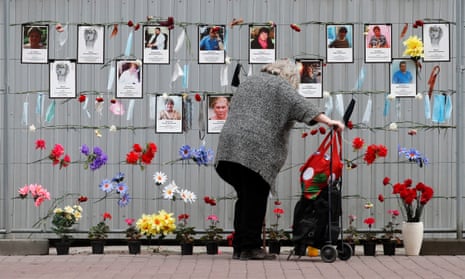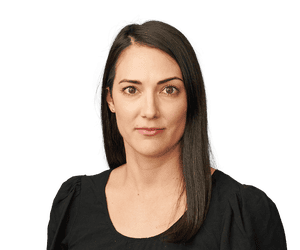We’ve launched a brand new blog at the link below – head there for the latest updates from around the world:
Putin to ease Russia lockdown despite record number of new infections – as it happened
UK and WHO to lead global Covid-19 information campaign; Aden declared an ‘infested’ city
Mon 11 May 2020 19.33 EDT
First published on Sun 10 May 2020 19.56 EDT- Summary
- Trump abruptly ends White House press briefing after clash with reporter
- White House staff ordered to wear masks
- Summary
- 'Extreme vigilance' needed as lockdowns end - WHO
- Putin eases Russia lockdown despite infection surge
- Covid-19 disruption could double Aids deaths - WHO
- UK and WHO to lead global Covid-19 information campaign
- Key enzyme puts men at higher risk of Covid-19
- Cannes abandons 'physical' festival for 2020
- Aden declared an 'infested' city
- Afghan cases 'will continue to surge'
- Switzerland eases lockdown restrictions
- Summary
- New Zealand to move to level 2 lockdown
- New Zealand records three new cases ahead of decision on lockdown lift

Live feed
- Summary
- Trump abruptly ends White House press briefing after clash with reporter
- White House staff ordered to wear masks
- Summary
- 'Extreme vigilance' needed as lockdowns end - WHO
- Putin eases Russia lockdown despite infection surge
- Covid-19 disruption could double Aids deaths - WHO
- UK and WHO to lead global Covid-19 information campaign
- Key enzyme puts men at higher risk of Covid-19
- Cannes abandons 'physical' festival for 2020
- Aden declared an 'infested' city
- Afghan cases 'will continue to surge'
- Switzerland eases lockdown restrictions
- Summary
- New Zealand to move to level 2 lockdown
- New Zealand records three new cases ahead of decision on lockdown lift
Summary
- Global confirmed death toll exceeds 285,000. The number of people known to have died since the pandemic began has reached at least 285,445, according to researchers at Johns Hopkins University. They say at least 4,168,427 people are known to have been infected. The figures are likely to significantly underestimate the true scale of the pandemic.
- White House staff ordered to wear masks. The White House directs staff working in the West Wing, where the daily operations of Donald Trump’s administration are carried out, to wear masks. A senior administration official says the directive will apply at all times other than when staff are at their own desks.
- Trump accused of racism over press conference comments. The president was criticised for telling an Asian-American journalist to direct her questions on the US’s epidemic to China, instead of to him. Trump insisted he would have answered the question the same way regardless of who had asked it. Trump refused to take further questions and abruptly ended the press conference. CNN’s influential chief media correspondent, Brian Stelter, said Trump’s actions had “racist overtones”, adding: “It’s racist to look at an Asian-American correspondent and say ‘ask China’; it’s part of a pattern from the president.”
- Senegal eases restrictions. The west African nation is reopening mosques and churches and easing other restrictions, even as it sees its largest one-day rise in cases. The president, Macky Sall, had ordered places of worship closed in March and imposed a dawn-to-dusk curfew. Since then, the daily pace of new cases has picked up – 177 on Monday from a previous high of 104 – with increasing community transmission in hotspots such as the holy city of Touba.
- Algeria touts rapid test kits. Algeria starts producing rapid test kits with a detection time of 15 minutes and a production capacity of 200,000 units per week, its government says.
- ‘No guarantee’ of vaccine, UK’s PM says There is no guarantee of a Covid-19 vaccine, says the British prime minister, Boris Johnson, but he adds that the UK is heavily involved in the work to develop one.
- ‘Extreme vigilance’ needed as lockdowns end – WHO. The World Health Organization says “extreme vigilance” is needed as countries begin to exit lockdowns imposed to curb the virus’ spread.
- Germany has reported an acceleration in new infections after taking early steps to ease its lockdown. South Korea, another country that succeeded in limiting infections, has seen a new outbreak in nightclubs.
- Putin eases Russia lockdown despite infection surge. The Russian president announces an easing of the nationwide lockdown, even as the country sees a record number of new infections. Vladimir Putin says people in some sectors will return to work, though restrictions on public gatherings will remain in place. “We have a long and difficult process ahead of us with no room for mistakes,” he tells Russians.
Donald Trump’s press conference on coronavirus testing ended abruptly after a terse exchange with two female reporters. Asked by CBS’s Weijia Jiang about his focus on international comparisons rather than US deaths, Trump snapped: ‘Don’t ask me, ask China that question’. After being asked by Jiang, who is Asian-American, why he had directed the remark at her, Trump cut off the CNN reporter Kaitlan Collins as she asked a question and walked away from the podium:
Hi, Helen Sullivan with you now. The best way to get in touch with me – and I welcome questions, comments or tips – is on Twitter @helenrsullivan.
Here’s the PBS White House correspondent Yamiche Alcindor on how the ending to Trump’s briefing played out:
Why did Trump end WH briefing? @weijia asked Trump why he sees this as "a global competition" when 80K have died. He said: "Ask China."
— Yamiche Alcindor (@Yamiche) May 11, 2020
He tried to move on but wouldn’t let @kaitlancollins ask her Q.
He called on me but I motioned for Kaitlin to ask her Q so Trump walked off.
Trump abruptly ends White House press briefing after clash with reporter

In Washington, Trump has ended his briefing on a sour note.
Asked by CBS White House Correspondent Weijia Jiang why he is fixated on comparing the US’s testing capability with other countries as opposed to focusing on the lag that still exists in the US, Trump replied: “Maybe that’s a question you should ask China. Don’t ask me, ask China that question, OK?”
He then called on CNN’s Kaitlan Collins, who ceded the mic to Jiang so she could ask her follow-up. Jiang, who is Asian-American, replied to Trump: “Sir, why are you saying that to me, specifically, that I should ask China.”
“I’m telling you, I’m not saying it specifically to anybody. I’m saying it to anybody that would ask a nasty question like that,” he said.
Collins then tried to ask her question but Trump skipped her. He then refused to take any more questions and left the podium.
Senegal is reopening mosques and churches and easing other restrictions, even as it sees its largest one-day jump in cases.
Its president, Macky Sall, ordered places of worship closed in March and imposed a dawn-to-dusk curfew. Since then, the daily pace of new cases has picked up – 177 on Monday from a previous high of 104 – with increasing community transmission in hotspots such as the holy city of Touba.
Senegal has recorded 1,886 cases in total, including 19 deaths.
Sall, like other leaders in West Africa, has confronted public pressure to find more sustainable ways to balance public health with economic realities in the face of an epidemic that the World Health Organization (WHO) has warned could drag on across Africa for years. He told the nation:
In the best of cases, Covid-19 will continue to circulate in the country until the month of August, or even September. In this new phase, that will last not a few weeks but three or four months, we need to learn to live in the presence of the virus.
The US Centers for Disease Control and Prevention (CDC) has reported 985 more deaths and 23,792 more confirmed cases since the weekend’s update, taking the overall totals to 79,756 and 1,324,488.
The CDC said the weekend’s numbers were preliminary and had not been confirmed by individual states.
The Guardian has published its editorial on the British prime minister’s message to the country as it moves into a dangerous new phase of the epidemic.
For more than 30 years, the term “consensus politics” fell out of fashion in Britain. For generations of Conservative politicians schooled in the dogmas of Thatcherism, the phrase came to connote unpleasant images of sandwiches with union leaders in No 10 and weak government.
Boris Johnson urgently needs to discover the virtues of consensus-building now, after a chaotic few days of mixed messages and confused assertions.

Donald Trump has been taking questions at his White House briefing. The first was about the White House staff who tested positive.
“I don’t think the system broke down at all,” he said. He said the person who tested positive “will be fine” and will be “out of quarantine very soon”.
He says it is “shocking”, given the number of people who come in and out of the White House every day, how few positive cases there have been. He adds: “I’ve felt no vulnerability whatsoever.”
Asked when Americans can get tested every day like his senior staff can, Trump said it would be “very soon”.
“We’re leaving that up to the governors,” Trump said when asked how Americans should feel about going back to work without more testing capacity. He then argued that some governors are being too slow to lift their restrictions.
Trump said it was his decision to require West Wing staffers to begin wearing masks.
Morocco has cleared disposable face masks for export after reaching a daily production capacity of 10m by 24 factories during its epidemic, the country’s industry minister, Hafid Elalamy, has said.
An average of 2m masks are sold daily in Morocco and the surplus will be exported now that a strategic stockpile of 50m masks has been secured, Elalamy told members of parliament.
Reusable masks will only be cleared for export once Morocco secures a stockpile of 15m, he said.
Morocco, which has been on lockdown since 20 March, has made wearing face masks mandatory since 7 April.
The north African country has been exporting medical protective gear and face shields, the minister said. He added that Morocco has secured self-sufficiency in ethanol, key to making sanitisers, with a daily production capacity of 24,000 litres.

Energy demand has plummeted during the Covid-19 crisis and global carbon dioxide emissions are anticipated to be 8% lower this year, compared with 2019. Is this affecting our weather and will it affect the global climate in years to come?
Carbon dioxide hangs around in the atmosphere for decades so it takes a long time for the impact to play out. Keith Shine, an atmospheric scientist at the University of Reading, estimates the Covid-19 effect might reduce warming by a measly 0.0025C in about 20 years time.
This is far below anything we can observe. If we were to sustain this 8% reduction over the coming years, Shine calculated, we would avoid about 0.15C of warming but, sadly, we would still massively overshoot our Paris agreement target of 1.5C.
This emphasises the scale of the task we have ahead of us.
Algeria has started producing rapid test kits with a claimed detection time of 15 minutes and a production capacity of 200,000 units per week, its government has said.
A laboratory in the capital, Algiers, developed the test kits in partnership with Canadian and Jordanian firms, the junior minister in charge of pharmaceutical production, Lotfi Benbahmed, said on state television, without naming the two foreign partners.